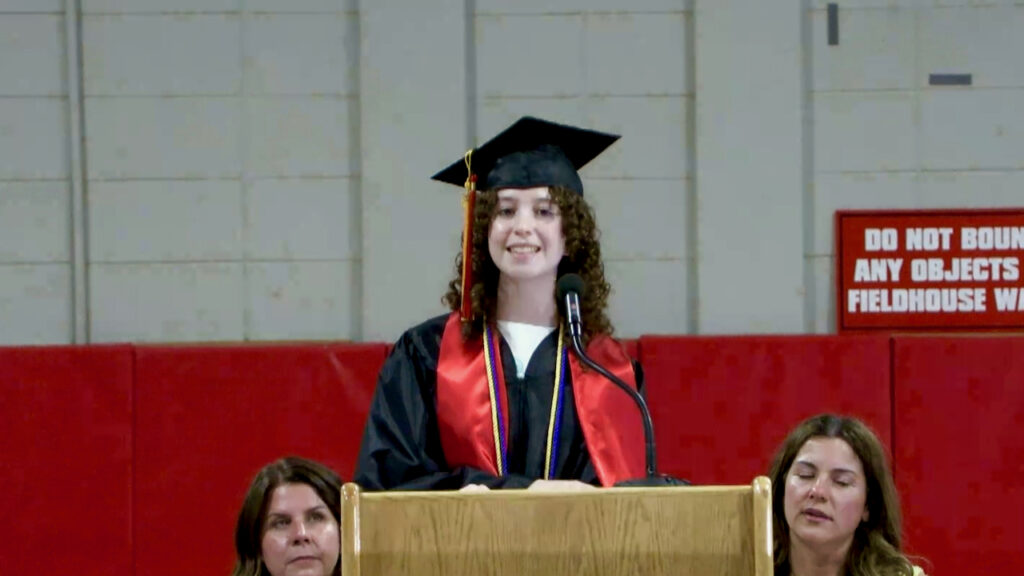
Good evening, and congratulations to my fellow seniors on this exciting new step into the rest of our lives.
I’m incredibly grateful to be speaking today and would like to thank all of our teachers, administrators, parents, and everyone who has led us along the way. We would not be here today without you. I would especially like to thank my parents, who are the two smartest and funniest people I know. Those who know them — or me — in real life know I am not joking nor exaggerating. You inspire me every day. I love you.
When we started high school with masks, standing six feet apart, it was difficult to imagine a future after the ravages of a pandemic… wait, wait, wait — you definitely don’t want to hear about that.
So seriously, looking at the Class of 2025, I see future lawyers, athletes, teachers, musicians, scientists, engineers, and much, much more. We’re all different, and none of us are perfect. I would like to speak to the imperfections of every single one of us, but I am keenly aware only of my own faults, and cannot speak to yours.
Wanting to be the best version of myself — and allowing myself to make mistakes — has been the tug-of-war that has dictated much of my high school experience. I know expecting perfection is unrealistic and will lead to disappointment, but whenever I let myself be imperfect, I feel like I’m wasting potential. I have to remind myself constantly that nothing in this life is perfect — and that I need to not only accept my imperfections, but revel in them.
Instead of being upset that both of our proms were during storms, all we can do is dance in the rain.
In the choir, a wrong note may create unexpected harmonies. On the ice or the field, a missed goal may become a great assist. This is only possible when people push past missteps to create something better. If the basketball team became mad every time someone missed a basket, that team would lose.
Not only do we need to accept our own imperfections, but we must accept other people’s. Do this not just for other people, but for yourself. Living life being annoyed with other people’s flaws is not living. Accepting and loving them because of these imperfections is liberating.
I know you thought you were done with English class, but this idea reminds me of one of my favorite poems, so forgive me for reading an excerpt from Mary Oliver’s The Ponds. She observes lilies in a pond and reflects on the imperfections she sees. Upon further examination, she realizes that the blemishes on the lilies do not make them less beautiful. Mary Oliver writes:
Still, what I want in my life
is to be willing
to be dazzled —
to cast aside the weight of facts
and maybe even
to float a little
above this difficult world.
I want to believe I am looking
into the white fire of a great mystery.
I want to believe that the imperfections are nothing —
that the light is everything — that it is more than the sum
of each flawed blossom rising and fading.
And I do.
Like Oliver, I long to acknowledge the imperfection in life and in myself, yet love life and myself regardless.
We are still young; we have a lot of life left to live. We will inevitably get blemishes like the lilies. We should be proud of the blemishes. A lopsided water lily is proof the water lily not only lived, but floated in the waters when it could have sunk.
As we go into the so-called “adult world,” we will get lost and mess up. We should be proud — not ashamed — of this, because it is proof of how hard we try.
In “this difficult world,” the imperfections we see are much more obvious than those of the lilies in the pond. I am not saying to ignore society’s problems — I am saying to live fully despite them, and to spite them. Only when we believe that the world is capable of beauty — that it is more than the sum of its flaws — can we start to improve it.
Class of 2025, remember: if we can overcome COVID we can… wait, wait, wait, wrong speech again.
RMHS Class of 2025, go out, make mistakes, and change the world.
